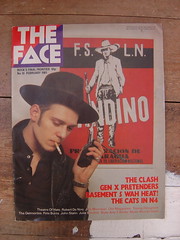 Morrissey: Ringleader of the Tormentors (Attack, 2006)
Morrissey: Ringleader of the Tormentors (Attack, 2006)I picked up a copy of
Spin magazine the other day. It's not something I tend to do, and I'm not sure why I made an exception, especially since Karen Yeah Yeah Yeah was modelling that blue-bus haircut on the cover. Ewww.
Anyway, as I flipped through it (the mag, not Karen's bad hair) while spooning some not-so-great yaki-soba into my jaded maw, I noticed that British music seems to be making one of its periodic flypasts over the landscape I still like to think of as the Canada-Mexico border. Yes, we know that James Blunt appeals to quantity surveyors on both sides of the Atlantic; and the colonials are even trying to get on the same mental planet as the
Arctic Monkeys.
But Spin takes it further. Jonathan Ames goes to a Goth convention in Illinois, and acknowledges there was living death before Marilyn Manson, namechecking Joy Division and Bauhaus. Simon Reynolds looks back to the "Second British Invasion" that dry-humped MTV until about Live Aid, giving us two (
two!!!!) pictures of naughty
Annabella Lwin, who's now (say it ain't so) 40 years old. Franz Ferdinand and The Darkness get news items, and a 'Definitive Guide To Pop Punk' sources half the top 10 key albums of the genre from the right-hand coast of the Atlantic. (If you're interested, they chose Buzzcocks, Generation X, the Rezillos, the Undertones and, uh, the Vibrators.)
And then there's an interview with Morrissey. Steven's on fine form, hymning the praises of his new Roman home and tipping Billy Crudup to play him in the inevitable Mozopic. He deflects the inevitable sexuality questions (
"Sometimes I feel explanations are very unnecessary and really spoil things.") and, yes, he talks about the new album.
And it's a perfectly good Q&A, by Marc Spitz, but the reason I bring it up is that I still think Americans (and an increasing number of Brits) miss the point about Morrissey. Yes, it's lovely to have him back, and he looks spiffy on the cover, in his white tie and tails, and isn't it slightly ironic that this curmudgeonly anachronism tops the British album charts in the first week when downloads count... but... but... but...

There's an 800-pound vegan gorilla in the room that nobody really, explicitly mentions, although Spitz hints hard. No, not that Morrissey's a big poof (although more on that anon). It's this.
Morrissey solo is not as good as The Smiths. There. Apart from that mysterious phalanx of Chicanos that Morrissey adopted during his LA sojourn, and the ever-loyal, sexually ambivalent West Ham fans, Moz on his lonesome does not provoke
the level of devotion and empathy that was exhibited between 1983 and 1987. And it's not nostalgia, and it's not wistful yearning for the reunion that won't happen, not even for $5 million. And it's certainly not that Morrissey now makes bad music.
Ringleader of the Tormentors is a good album. It's just that nothing on it gives you that cerebral judder, half orgasm, half kick in eye, that happened when 'Bigmouth Strikes Again' first struck. Or 'Ask' or 'Reel Around The Fountain'. Or 'Barbarism Begins At Home' or 'Shakespeare's Sister' or 'Suffer Little Children' or 'Handsome Devil' or 'What Difference Does It Make?' or 'Paint A Vulgar Picture' or 'You Just Haven't Earned It Yet Baby' or...
Need I continue?
Right, the album. Yes, it's good stuff. Mozz seems happy in his new home, but this hasn't lost his gift for the cutting
bon mot (or
mauvais mot in his case). As he says in 'On The Streets I Ran', Morrissey's peculiar talent is for turning
"sickness into popular song", and he's still preoccupied with death and failure and loneliness and all that makes life worthwhile. His cultural references have shifted a little, with Shelagh Delaney being replaced by Pasolini and Visconti (Luchino, not Tony), but it's still Moz.
But what's this?
"Explosive kegs between my legs"? Morrissey has, you know,
organs? And it's not just sex, there's love too.
"I live only for you," he trills on 'Life Is A Pigsty'. The pop world's most notorious celibate (Britney couldn't hack it) is not only indulging in moist rudeness, he's yodelling the fact from the spire of St Peter's.
"I once was a mess of guilt because of the flesh," he sighs.
"It's remarkable what you can learn." Not that all's entirely well, of course.
"I would give you my heart," he declares later;
"That's if I had one" So contentment in the boudoir hasn't dulled his caustic drollery. And it sounds great, too. Tony (not Luchino this time) Visconti produces, bringing on the arranging prowess of Ennio Morricone for one track. Anyone yearning to discover what The Smiths would have been if they'd had a real string section can find out here (with all due respect to Orchestrazia Ardwick and the Hated Salford Ensemble). The three guitarists provide a variety of textures and effects, especially on the opener 'I Will See You In Far Off Places' with its cheekily cod-Indian atmospherics (Bengali in plectrums, anyone?). Mikey Farrell offers some fun piano and trumpet twiddles, although the proggy vamping on 'I'll Never Be Anybody's Hero Now' is probably an experiment too far. Mozz yelps in ways he hasn't since 'This Charming Man' and a single Morrissey yelp has more sex ammo than Christina Aguilera frotting the stage anyday.

It seems as if everything is in its right place, as
David Cameron's other favourite band puts it. Except for tunes. Despite Johnny Marr's acclaimed axe heroics, it was his tunes that keep The Smiths a couple of steps ahead of even the best of Morrissey's solo material. Just listen to the
Live at Earl's Court album, and the gasps from the punters when Morrissey kicks into tunes written before many of them were conceived. It must be deeply frustrating for long-established artists to have their recent stuff dismissed in favour of the stuff from decades ago, but there may be more in the phenomenon than familiarity and laziness. Ron Wood (the Craig Gannon of grandad rock?) is always complaining that he's perceived as a replacement guitarist, despite the fact that he's been with the Stones for about 75% of their recording career. He hasn't quite got it through his comedy mullet that in his stint with the band, they've never come up with anything half as good as 'Paint It, Black' or 'Let's Spend The Night Together'.
So what's the Poet Laureate of the Maladjusted to do? Well, since any formal reunion with Marr and the others is bound to collapse under the weight of frenzied expectations, tensions and unresolved legal and accounting quibbles, he simply has to find another composer that can match Marr's ear for a tune. Which means not Alain Whyte, basically. Or anyone he's worked with in the last 19 years. Brian Wilson? Burt Bacharach? Paul McCartney? All genius tunesmiths who've stumbled a little when it comes to lyrics. Crazier things have occurred. Hell, if you fly on autopilot for long enough, there's always Rick Rubin to help out.
Ach, what does he care? The Hammers fans and South Central Chicanos will still love this, and now the Roman
paninari will probably join the club. But the sad sacks who still troop to the door of Salford Lads' Club will play this a few times, and file it under
"Oh well, suppose it's better than Southpaw Grammar".
"So if there was a Smiths reformation," says Mozz in the Spin interview,
"I don't think there would be gasps around the planet."Oh Steven, if only you knew.

 Mango Sauce, a site aimed at male expats in Thailand, is closing down because Google (upon which it relies for ad revenue) has decided that its content is a bit too, well, fruity.
Mango Sauce, a site aimed at male expats in Thailand, is closing down because Google (upon which it relies for ad revenue) has decided that its content is a bit too, well, fruity.






























